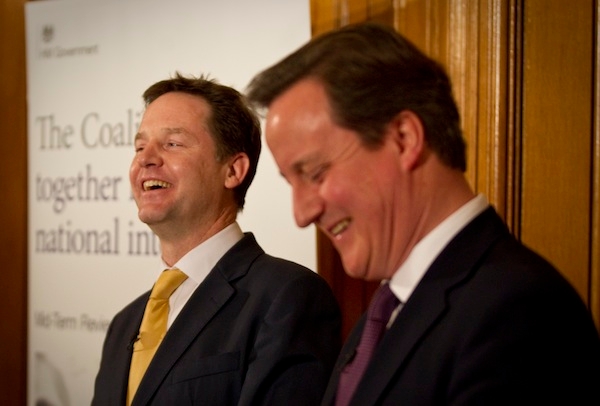The success of Britain’s coalition government over the last two years has been extraordinary. That two parties could come together, in Westminster’s adversarial system, was itself unusual. That they could agree a radical programme of government: school reform and welfare reform, was exceptional. But in my Telegraph column today, I say suggest that the battles over the spending review suggest that this spirit of co-operation is ending – and that the condition might be terminal. Here are my main points:
1. The constructive phase of coalition. When I served a tour of duty in the Scottish Parliament, I was struck by how the LibDems profited from coalition with Labour. They had control of departments: justice and rural affairs. They handled these well, thanks were judged by what they could build and ended up with more votes and seats. The Westminster model of coalition was wrong. Cameron erred, I believe, in flicking the parties into a blender and trying to press the ‘on’ switch. His idea was that every victory, and defeat, should be a shared one. At first, this worked out. The 2010 Coalition Agreement was an agenda for radical change.
The economic progress was over-hyped, as I argue in my cover story for The Spectator this week. But the sense of mission, unity and harmony was striking. I was wrong to be so dismissive of Nick Clegg: he has proven a principled leader, very serious about government and keen to disprove the idea that coalitions fail in Britain. If it were up to him, then coalition would still work. But it’s not. He has lost a half of LibDem voters, and his plans to rebuild as a centre party are not working. The LibDems main chance of recovery is to try to reposition itself as a left-wing party under a new leader. Clegg hopes to survive, but knows this means delivering ‘wins’ for his party. This has led to…
2. The destructive phase of the coalition. After the AV referendum, the LibDems embarked on a process of distancing and differentiating themselves from the Tories, which meant drawing up a list of LibDem ‘wins’. This was pretty much forced on Clegg by his backbenchers, and meant the LibDems would be an opposition within a government. Play the role of Brownites, to Cameron’s Blairites. This is why LibDems now place totemic importance on policies they didn’t even have a few years ago, like Mansion Tax. Unlike the Holyrood system, where LibDems were judged on what they can create, many Tories now feel LibDems judge themselves on what they can destroy or thwart.
3. The Spending Review 2013. The idea of setting every budget for every department from 2014-17 was political enough to begin with: Osborne’s plan is to force Balls to sign to his cuts, as he once signed up to Brown’s spending. But add the leadership speculation and SR13 has become sodden with political intrigue.It’s said that Osborne loves to see politics as multi-dimensional chess. SR13 has become multi-dimensional war: pro-coalition LibDems vs the refuseniks, Tory left vs Tory right, Tories vs the quad. Theresa May, Philip Hammond and Chris Grayling have all broken ranks and are openly advocating for more welfare cuts (instead of police, defence and justice respectively being cut). How so?
4. The quad. The Cabinet is not the cockpit of the British government, not any more. Cabinet meetings are held so ministers can hear what the quad has decided. The quad – Cameron, Osborne, Clegg and Alexander – gives 50pc of the power to LibDems. Not bad for a party with just 9pc of the seats. It was the quad, I understand, that rejected proposals for a freeze in working-aged welfare and insisted on a 1pc rise instead. This far-more-more expensive option meant piling on more pain to defence and the police. I quote a Cabinet member in my Telegraph column saying that the quad has become the British government and the Cabinet members have been reduced to the role of bystandanders.
5. Quad failure means coalition failure. The quad was not supposed to become the seat of government, but it has become so. All of a sudden it matters less how many LibDems there are in Cabinet, because they hold half of the power in Cabinet’s decision-making body. This irks Tory Cabinet members. Hammond feels happy to demand more military spending because it’s not an attack on Osborne. It’s an attack on the quad, and could be seen as a loyal attempt to strengthen the Tories in the quad.
6. Mutinous Tories. There Tories are going through one of their regicidal phases. Already, you hear talk about how many signatures have been handed to Graham Brady, chair of the 1922 Committee. A no-confidence vote would be madness, and not just because Cameron is the single greatest asset that the Tory Party has. A vote would not just fail but leave a divided (and ridiculed) Tory Party, a weakened leader and even less chance of victory in 2015. But as a senior Tory told me earlier this week, it’s not clear that the Tory rebels are thinking clearly. Now that the 2014 local elections are to be held on the same day as the European Parliament elections, there’s talk of UKIP taking entire councils.
7. Osborne has asked all ministers to accept sharp cuts next time which is what set this all off. Grayling, May and Hammond believe (rightly) that prisons, police and the military have suffered enough, and that there ought not be across-the-board cuts. A 2pc cut in the welfare bill would protect the budgets of all three departments and a Tory-only government would have reached this deal. But the ‘quad’ rejected it.
8. Tory leadership speculation has emboldened May and Hammond. May is seen by bookies as the MP most likely to succeed Cameron. Ladbrokes has Boris as the favourite. We all know how Tory leadership campaigns go: 1) the favourite and 2) the anyone-but-the-favourite candidate. May is being spoken of as the anti-Boris. And even Hammond’s at 10/1. This puts a spring in both of their step, cheered on by the Tory MPs who are dismayed at the way that Cameron and Osborne are happy go along with the ‘quad’ model.
9. Plenty, perhaps half, of Tory MPs believe this leadership election is just two years away. If you believe Cameron will be PM after the next election, then head down to the bookies where you can treble your money if you are right. God knows I don’t want to live under a Labour government, but a Tory defeat (and, ergo, a 2015 leadership contest) is more likely than not. Not so long ago, May was being teased for her lack of accomplishment. Now she has put Abu Qatada in a catapult, faced down the police unions, pledged to tear up the ECHR and – most impressively of all – survived three years as Home Secretary without a career-ending implosion. A few of her colleagues believe that being spoken of as a potential leader puts a spring in her step.
10. All this politiciking means that the spending review will not be about need or fairness. It’ll be about party politics. The LibDems last year vetoed Osborne’s (brave) plan to abolish the supertax for the rich, so it stayed but at 47p rather than 52p. Just out of spite, because Cameron wouldn’t agree to their mansion tax. At Budget time, they demand more tax credits – costing billions – to flatter the IFS’s decile graphs so it can fit an arbitrary fairness test. Both of these mark the corruption of policy through political positioning – and it’s getting worse. Cable’s insomnia-curing essay for the New Statesman asks why we shouldn’t borrow more to build schools. Maybe because the many people wishing to set up schools lack planning permission, rather than property? But the LibDems want a ‘win’. At first, they agreed to a shared agenda policies. Now, it’s more about party political advantage – precisely what the Tories warned about in their pre-election video about the problems of coalitions.
The original Coalition Agreement was radical enough to last for five years, so they don’t really need a new agenda. If they reform schools or welfare, they’ll do more than Labour managed in 13 years. But it looks like the Tories and the LibDems cannot repeat the trick. The fear and loathing is making it hard to agree on anything, let alone something as complex as the 2014-17 Spending Review.







Comments